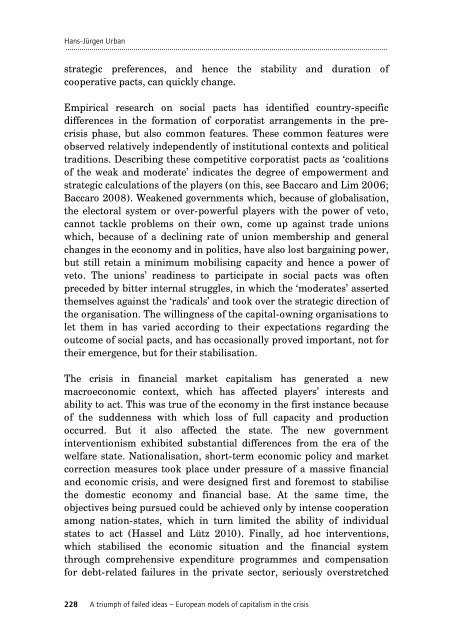A triumph of failed ideas European models of capitalism in ... - Journal
A triumph of failed ideas European models of capitalism in ... - Journal
A triumph of failed ideas European models of capitalism in ... - Journal
Create successful ePaper yourself
Turn your PDF publications into a flip-book with our unique Google optimized e-Paper software.
Hans-Jürgen Urban.................................................................................................................................................................strategic preferences, and hence the stability and duration <strong>of</strong>cooperative pacts, can quickly change.Empirical research on social pacts has identified country-specificdifferences <strong>in</strong> the formation <strong>of</strong> corporatist arrangements <strong>in</strong> the precrisisphase, but also common features. These common features wereobserved relatively <strong>in</strong>dependently <strong>of</strong> <strong>in</strong>stitutional contexts and politicaltraditions. Describ<strong>in</strong>g these competitive corporatist pacts as ‘coalitions<strong>of</strong> the weak and moderate’ <strong>in</strong>dicates the degree <strong>of</strong> empowerment andstrategic calculations <strong>of</strong> the players (on this, see Baccaro and Lim 2006;Baccaro 2008). Weakened governments which, because <strong>of</strong> globalisation,the electoral system or over-powerful players with the power <strong>of</strong> veto,cannot tackle problems on their own, come up aga<strong>in</strong>st trade unionswhich, because <strong>of</strong> a decl<strong>in</strong><strong>in</strong>g rate <strong>of</strong> union membership and generalchanges <strong>in</strong> the economy and <strong>in</strong> politics, have also lost barga<strong>in</strong><strong>in</strong>g power,but still reta<strong>in</strong> a m<strong>in</strong>imum mobilis<strong>in</strong>g capacity and hence a power <strong>of</strong>veto. The unions’ read<strong>in</strong>ess to participate <strong>in</strong> social pacts was <strong>of</strong>tenpreceded by bitter <strong>in</strong>ternal struggles, <strong>in</strong> which the ‘moderates’ assertedthemselves aga<strong>in</strong>st the ‘radicals’ and took over the strategic direction <strong>of</strong>the organisation. The will<strong>in</strong>gness <strong>of</strong> the capital-own<strong>in</strong>g organisations tolet them <strong>in</strong> has varied accord<strong>in</strong>g to their expectations regard<strong>in</strong>g theoutcome <strong>of</strong> social pacts, and has occasionally proved important, not fortheir emergence, but for their stabilisation.The crisis <strong>in</strong> f<strong>in</strong>ancial market <strong>capitalism</strong> has generated a newmacroeconomic context, which has affected players’ <strong>in</strong>terests andability to act. This was true <strong>of</strong> the economy <strong>in</strong> the first <strong>in</strong>stance because<strong>of</strong> the suddenness with which loss <strong>of</strong> full capacity and productionoccurred. But it also affected the state. The new government<strong>in</strong>terventionism exhibited substantial differences from the era <strong>of</strong> thewelfare state. Nationalisation, short-term economic policy and marketcorrection measures took place under pressure <strong>of</strong> a massive f<strong>in</strong>ancialand economic crisis, and were designed first and foremost to stabilisethe domestic economy and f<strong>in</strong>ancial base. At the same time, theobjectives be<strong>in</strong>g pursued could be achieved only by <strong>in</strong>tense cooperationamong nation-states, which <strong>in</strong> turn limited the ability <strong>of</strong> <strong>in</strong>dividualstates to act (Hassel and Lütz 2010). F<strong>in</strong>ally, ad hoc <strong>in</strong>terventions,which stabilised the economic situation and the f<strong>in</strong>ancial systemthrough comprehensive expenditure programmes and compensationfor debt-related failures <strong>in</strong> the private sector, seriously overstretched228 A <strong>triumph</strong> <strong>of</strong> <strong>failed</strong> <strong>ideas</strong> – <strong>European</strong> <strong>models</strong> <strong>of</strong> <strong>capitalism</strong> <strong>in</strong> the crisis








